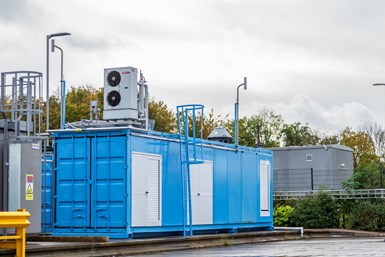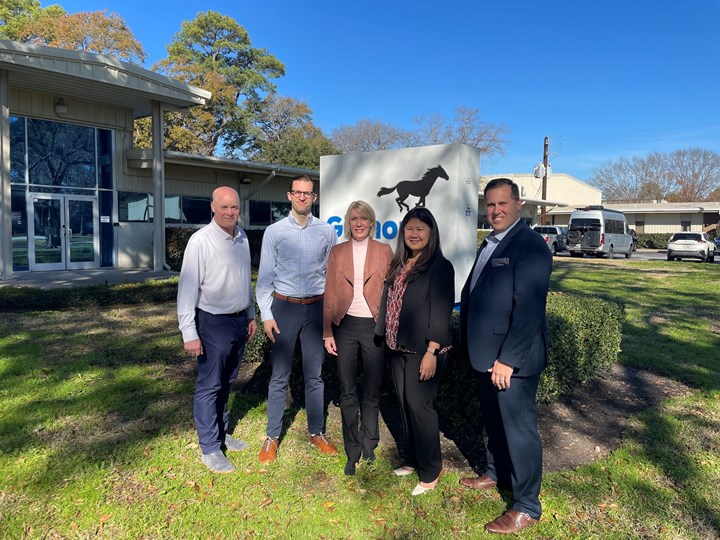Industry News
Industry news; acquisitions; projects
First National Legally Enforceable Drinking Water Standard for PFAS Passed
On April 10, the first-ever national, legally enforceable drinking water standard to protect communities from exposure to harmful per- and polyfluoroalkyl substances (PFAS), also known as “forever chemicals,” was issued. Exposure to some PFAS has been linked to deadly cancers, impacts to the liver and heart, and immune and developmental damage to infants and children. This final rule represents the most significant step to protect public health under the EPA’s PFAS Strategic Roadmap.
The final rule will reduce PFAS exposure for approximately 100 million people, prevent thousands of deaths and reduce tens of thousands of serious illnesses. The announcement complements President Biden’s governmentwide action plan to combat PFAS pollution.

In addition to this ruling, the EPA is announcing nearly $1 billion in newly available funding through the Bipartisan Infrastructure Law to help states and territories implement PFAS testing and treatment at public water systems, and to help owners of private wells address PFAS contamination. This is part of a $9-billion investment through the Bipartisan Infrastructure Law to help communities with drinking water impacted by PFAS and other emerging contaminants — the largest-ever investment in tackling PFAS pollution. An additional $12 billion is available through the Bipartisan Infrastructure Law for general drinking water improvements, including addressing emerging contaminants like PFAS.
For more information on PFAS and its impact on the valve industry, see the feature story on page XX.
Blue Biofuels Announces Commencement of Engineering Study for Ethanol Plan
In a recent development, Blue Biofuels Inc. (BIOF) announced the commencement of an FEL 1 & 2 engineering study for a 2.4-million-gallon cellulosic ethanol facility. This endeavor is grounded in the company's Cellulose-to-Sugar (CTS) system, which has undergone and is undergoing continuous refinement and optimization for the efficient conversion of cellulosic biomass into ethanol.
The engineering study outlines each process step, technical layout and required equipment for the facility. Even at this initial volume, it demonstrates the viability of the CTS process in yielding positive margins for cellulosic ethanol production. Blue Biofuels is now poised to scale up its engineering design for larger facilities, leveraging the inherent advantages of scale to enhance profitability.
Drawing on successes achieved in its pilot plant, Blue Biofuels remains committed to further enhancing its process, focusing on catalyst recycling and lignin separation for potential sale. While lignin sales are not yet factored into the model, ongoing optimizations signify a commitment to maximizing efficiency and sustainability.
Interior Department Finalizes Rule Reducing Oil and Gas Waste on Tribal Lands
The Department of the Interior announced a final rule from the Bureau of Land Management (BLM) that will curb the waste of natural gas during the production of oil and gas on federal and tribal lands. This final rule modernizes regulations that are more than 40 years old, and will hold oil and gas companies accountable by requiring measures to avoid wasteful practices and find and fix leaks, while ensuring that American taxpayers and tribal mineral owners are fairly compensated through royalty payments.
The rule is expected to generate more than $50 million in additional natural gas royalty payments each year to the federal taxpayer and tribal mineral owners, while conserving billions of cubic feet of gas that might otherwise have been vented, flared or leaked from oil and gas operations. This conserved gas will be available to power American homes and industries.
“This final rule, which updates 40-year-old regulations, furthers the Biden-Harris administration’s goals to prevent waste, protect our environment and ensure a fair return to American taxpayers,” says Secretary Deb Haaland. “By leveraging modern technology and best practices to reduce natural gas waste, we are taking long overdue steps that will increase accountability for oil and gas operators, and benefit energy communities now and for generations to come.”
The final rule responds to a series of U.S. Government Accountability Office reports highlighting revenue lost due to the BLM’s outdated regulations. Several states — including Colorado, New Mexico, Pennsylvania and Wyoming, as well as the U.S. Environmental Protection Agency (EPA) — have taken steps to limit venting, flaring and/or leaks from oil and gas operations either for purposes of preventing waste, as is BLM, or improving air quality. The BLM rule is separate and distinct from the EPA rule and ensures that operators can comply with applicable state, tribal or federal rules while meeting these commonsense requirements.
IMI Delivers More Than $18 Million in Orders for Hydrogen Projects
IMI has announced a record year for orders throughout the hydrogen value chain in 2023. Last year the company doubled its 2022 orders to deliver more than $18 million USD (£15m) worth of projects to support hydrogen generation.
Key milestones included a successful field test of the company’s IMI Vivo polymer electrolyte membrane (PEM) electrolyzer at its 16,000 m2 facility in Sardinia in May 2023.

Available in 100 kW to 5 MW power class skids, the IMI VIVO electrolyzer can be made fully bespoke to end-user requirements thanks to a ‘turnkey’ configuration that includes a high- or low-pressure storage tank, compressor and optional fueling equipment.
First Corporate Green Bond for Nuclear Energy from Constellation
Constellation, the nation’s largest producer of carbon-free energy, issued the first corporate green bond in the United States that can be used to finance nuclear energy projects. Constellation will use proceeds from the $900 million, 30-year term offering for investments such as maintenance, expansion and life extensions of its clean, reliable nuclear power generation that reduce or avoid carbon emissions, or provide other environmental benefits.
A green bond is a financial instrument that is issued specifically to finance projects or activities that deliver positive environmental or climate impacts. It enables investors to actively support investments that promote sustainability and help address environmental challenges.
“Elected officials on both sides of the aisle, climate and sustainability advocates and the general public are increasingly recognizing the value nuclear energy delivers, not only for its unmatched 24/7 reliability but for its positive environmental impact as a clean energy resource. The strong market response shows the investment community agrees nuclear energy is a unique clean-energy technology that will play a critical role for decades to come and is a safe, long-term investment,” says Dan Eggers, executive vice president and CFO, Constellation. “With the nation’s first-ever corporate nuclear green bond issuance as part of our long-term financing mix, Constellation and the market have again confirmed: Nuclear investments are long-term sustainability investments.”
Learn more about Constellation’s sustainability performance in its 2023 sustainability report.

Acquisitions/Sales
Control Devices LLC Acquires Gilmore
Control Devices, a portfolio company of HBM Holdings, has acquired Gilmore. The acquisition expands Control Devices’ flow control solutions portfolio while widening its reach in the oil and gas market. The acquisition also broadens HBM Holdings’ expertise in the flow control sector.
“Gilmore has a history of excellence in the development of severe service flow control solutions and is known for quality and operational excellence, all supported by the talented Gilmore team,” says Jim Norris, president and CEO of Control Devices. “With this acquisition, we are enthusiastic about expanding our products, technology and capabilities.”

From left to right: Jim Norris CEO, CDI; Justin Lammert CFO, CDI; Amy Fields SVP and Chief People Officer, HBM; Keathya Hill Controller, Gilmore; David Nemetz CEO, Gilmore.
Source: Control Devices
Headquartered in Houston, Texas, Gilmore designs and manufactures high-performance severe-service valves and other flow control solutions, including custom valves to meet client specifications and pressure relief systems. Its products are designed for demanding applications and harsh environments in the upstream oil and gas industry.
Control Devices is a designer and manufacturer of highly engineered flow control products utilized in niche applications across various end markets.
Metal Processing International and Oklahoma Custom Coating Rebrand as ecoat.us
Metal Processing International and Oklahoma Custom Coating, two leading companies in metal processing and coating services, announced their rebranding as ecoat.us, effective immediately. With this rebranding, ecoat.us aims to better reflect their commitment to sustainable and advanced electrocoating practices, while continuing to provide exceptional service to their loyal customers. The name change aligns with their mission to be at the forefront of advanced electrocoating solutions.
Under this new brand, ecoat.us will continue to provide a comprehensive range of metal processing and coating services, including but not limited to electrocoating, powder coating, metal cleaning and surface treatment.
Importantly, ecoat.us will retain the same ownership and management personnel as its predecessor companies. This continuity ensures a smooth transition and guarantees that customer relationships and satisfaction will remain their top priority.
Talos Energy Announces Divestiture of Subsidiary to TotalEnergies
Talos Energy Inc. (Talos) announced that it has entered into an agreement for the sale of its wholly owned subsidiary, Talos Low Carbon Solutions LLC (TLCS), to TotalEnergies E&P USA Inc. (TotalEnergies) for a purchase price of $125 million plus customary reimbursements, adjustments and retention of cash, combined totaling approximately $148 million. Talos intends to use the proceeds from the sale to immediately repay borrowings under its credit facility and for general corporate purposes.
The sale includes Talos’s entire carbon capture and sequestration (CCS) business, including its three projects along the U.S. Gulf Coast: Bayou Bend CCS LLC, Harvest Bend CCS LLC (Harvest Bend) and Coastal Bend CCS LLC (Coastal Bend).
Talos President and Chief Executive Officer Timothy S. Duncan says, “Since TLCS’ inception, we have successfully applied our energy expertise as an early mover aimed at developing decarbonization solutions along the U.S. Gulf Coast. The transaction will further enable Talos to prioritize cash flow generation and optimal capital allocation in our core Upstream business. We are also continuing to explore business development and strategic M&A opportunities.”
NSF Acquires PSILab Inc.
NSF, a global public health and safety organization, announced the acquisition of PSILab Inc., a U.S.-based advanced product testing and consulting laboratory specializing in plastic pipe, pipe materials, and other polymeric and composite products.
An ISO 17025-accredited, state-of-the-art laboratory, PSILab Inc. is located in Longmont, Colorado, and provides laboratory testing, failure analysis and consulting services. As a result of the acquisition, existing NSF clients will have added access to new testing services, including material properties and large-diameter pipe testing, finished goods hydrostatic pressure and burst testing, extensive product failure analysis and plastic pipe consulting.
Curtiss-Wright Completes Acquisition of WSC Inc.
Curtiss-Wright Corp. has completed the acquisition of WSC Inc. for approximately $34 million in cash. WSC is a provider of state-of-the-art simulation technology that supports the design, commissioning and reliable operation of commercial nuclear power generation and process plants worldwide with an installed base of over 225 plant simulators.
The acquired business will operate within Curtiss-Wright’s Naval and Power segment.
WSC’s proprietary 3KEYMASTER simulation platform is used in its nuclear full-scope simulators mandated by the Nuclear Regulatory Commission (NRC) and remain integral to reactor operator training and licensing. Simulation-assisted engineering tools optimize the design and commissioning of plants, including Advanced Small Modular Reactors (ASMRs), by creating a digital twin of plant components and systems to reduce risk, accelerate delivery and improve quality at a lower cost.






 Unloading large gate valve.jpg;maxWidth=214)


